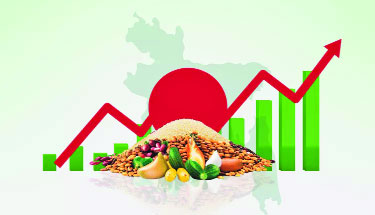Inflation rate in Bangladesh double than India-Nepal
Staff Correspondent: Overall inflation in the country stood at 9.72 percent in June. And in the fiscal year 2023-24, the average price inflation in the country was 9.73 percent. Although overall inflation eased in June, food inflation remained above 10 percent in rural and urban areas. These data have emerged in the latest report of Bangladesh Bureau of Statistics (BBS).
According to BBS data, inflation in Bangladesh was double that of India and Nepal in the last two months (May-June) of the outgoing financial year. And Sri Lanka was only 1.7 percent. Only Pakistan’s inflation rate is slightly higher than Bangladesh’s.
Sri Lanka, the fastest growing country in South Asia, is facing an unprecedented economic and political crisis. The country suffered the worst situation in 2022. The island nation’s inflation has hovered around 60 percent. Due to the reserve crisis, the import of essential products like fuel oil is stopped. The Sri Lankan government also declared bankruptcy due to failure to pay import debts and foreign debts. But Sri Lanka is quickly overcoming the most fragile situation in history. The rate of inflation gradually decreased to 1.7 percent last June. The rate was below 1 percent in May, according to the country’s central bank.
Inflation in neighboring India also fell to a two-year low. Data for the country’s election month of June is not yet available. However, according to data from India’s Ministry of Statistics, the country’s inflation rate was 4.75 percent in May. Inflation in Nepal is also at its lowest level in the last 31 months. Nepal’s inflation rate was 4.4 percent in May, according to the country’s central bank. A year ago, this rate was 7.41 percent. Political and economic crisis in Pakistan has higher inflation than Bangladesh. According to the country’s statistics department, the inflation rate in Pakistan was 12.6 percent in June.
Due to the impact of the Covid-19 pandemic and the Russia-Ukraine war, inflation began to increase in most countries of the world at the beginning of 2022. Crude oil prices exceeded $130 per barrel. The prices of coal, gas and other energy products also increased at an abnormal rate. The prices of essential commodities including edible oil and wheat were also on the upward trend. Added to this are extraordinary transportation costs. The foreign exchange reserves of various countries are in crisis due to the increase in import costs. But the inflation picture of almost all countries has changed in the last six months. The price of fuel oil in the world market has also decreased to $80 per barrel. Prices of edible oil, foodgrains, fertilisers, agricultural raw materials, fertilizers and practical or industrial metals have also been falling for several consecutive months. But the opposite picture is in the country’s market. Prices of all commodities including consumer goods in Bangladesh are still unstable. As a result, the rate of inflation is not under control.
The government and the central bank have taken one step after another since the beginning of the fiscal year to control inflation. The loan interest rate in the bank sector was increased several times from 9 percent to 14 percent. Now leaving it to the market, the interest rate in some banks has gone up to 16 percent. The central bank has also moved away from lending to the government by printing money as part of the contractionary monetary policy. The prices of certain daily commodities are also determined in several phases to control the market. Law enforcement forces have repeatedly launched operations to control hoarding. As part of the contractionary monetary policy, the budget for the new fiscal year is also not as expansionary as the previous year. Despite all these efforts, the rate of inflation in the country cannot be brought under control.
The executive director of Institute for Inclusive Finance and Development (INF)Mustafa K Mujeri, a research and policy support organization, believes that this has happened because Bangladesh adopted a contractionary monetary policy late compared to neighboring countries. He also sees the weakness of market management as a major reason. He told, ‘These countries took steps to control inflation with a strong hand. There are many weaknesses in our market management. Here powerful syndicates influence the market value chain for their own benefit. As a result, inflation cannot be controlled by monetary policy alone.
Revenue and other policies should also be consistent.
Food and non-food inflation eased marginally in June, according to the latest BBS figures. However, food inflation in rural and urban areas remains above 10 percent. Food inflation has come down to 10.42 percent and non-food inflation has come down to 9.15 percent. In urban areas, food inflation is 10.54 percent, non-food inflation is 8.98 percent. Inflation in rural areas is 10.39 percent for food products and 9.26 percent for non-food products.
Chairman of the Parliamentary Standing Committee on Planning Ministry MA Mannan feels that there is no reason to fear about the existing price inflation. He recently told, “A century ago, the rate of inflation was 5 percent. From there it has now increased to 9 percent. That is, inflation in the country has increased at a snail’s pace. At the same time people’s income also increased. So, people have adapted to it. I don’t see any fear about it even among the villagers. And the government is selling products at cheap prices through one crore cards. TCB is selling products at low prices. Without these measures, inflation would have gone up to 14-15 percent. The initial stage of growth is inflation; It has to be accepted.’
Rare Israeli airstrike in Beirut kills Hezbollah commander and more than a dozen others
International Desk: Israel launched a rare airstrike that killed a senior Hezbollah milita…








